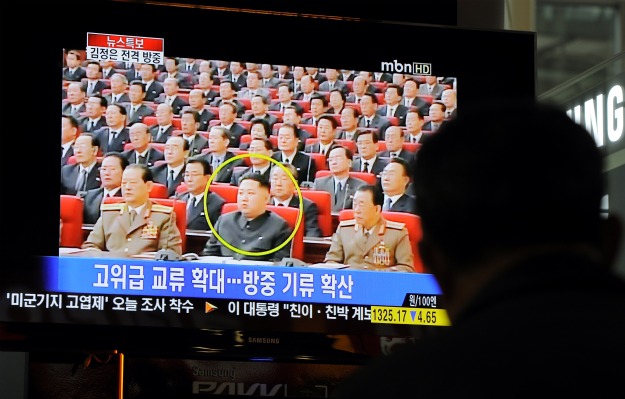Could Kim Jong Il’s regime be the next autocratic government to fall? Don’t bet on it.

SEOUL — In mid-February, as Libya shook to the incipient revolt against Muammar al-Qaddafi, around 200 North Korean migrant workers found themselves stranded. Like their compatriots in other parts of the Middle East, they had been brought in to work as cut-price doctors, nurses, and construction workers. But with a popular uprising unfolding, their government now refused to repatriate them.
According to reports, Pyongyang ordered the workers to remain in Libya out of fear that what they witnessed — a full-blown popular rebellion against Qaddafi’s dictatorship — could lead to a copycat rebellion back home. “The fear was obviously that these 200 would have a kind of a viral effect, bringing news and information about what was happening in Libya,” said Tim Peters, founder of Helping Hands Korea, which aids North Korean refugees.
Mass popular uprisings, so often a contagious affliction, pose problems for any dictatorship. For North Korea, the outbreak of revolts in Egypt and Libya — two steadfast allies of the hermit regime — has prompted swift moves to head off a similar outbreak of democracy on its own turf.
The first line of defense, as always, has been information. Although the NATO strikes against Qaddafi’s regime brought a string of shrill denunciations in the state-run media, the regime has been all but silent about the Arab uprisings. At the same time, it has moved to tighten border controls in order to prevent “unofficial” news from getting in.
Peters said that both Beijing and Pyongyang were very nervous about the “potential virus effect” of the political awakening in the Middle East. Since the run-up to the 2008 Beijing Olympics, the porous Chinese-Korean border, which has acted for years as an escape route for defectors and smugglers, has been rigged with cameras and heat and motion sensors in a bid to stem illegal crossings. The crackdown, he said, has only intensified since the outbreak of the Arab revolts. “The knee-jerk reaction in both places is more control, restrictions — essentially, lockdown,” Peters said. Marcus Noland of the Peterson Institute for International Economics said that this year, restrictions have even been extended to those who have legitimate permission to travel to China for trade purposes.
In recent months, North Korea has also launched a crackdown on the possession of Chinese cell phones — a key source of outside news and information. North Korea’s own mobile-phone service, provided by Egypt’s Orascom Telecom, with about 500,000 subscribers, is blocked to international calls and subject to close surveillance. Jiro Ishimaru, chief editor and publisher of Rimjin-Gang, a Japan-based publication that smuggles video reports out of North Korea, told me that “more than 10,000 people” in border regions were suspected of using Chinese phones, which can call internationally and are a key link to outside media reporting on North Korea.
North Korea Intellectuals Solidarity (NKIS), a defector group that smuggles information in and out of the North via the Chinese border, said recently that police in North Hamgyong and Yanggang provinces, bordering China, had begun urging residents to surrender Chinese mobile phones voluntarily or face punishment. The campaign was being mounted against “those spreading capitalist ideas and eroding socialism,” the group said, quoting a source inside the North. Ishimaru confirmed the region has been the subject of harsh police crackdowns since the revolts kicked off in the Middle East. “They patrol with vehicles carrying German-made radio detectors to track down and hunt users,” he said. But it may not be enough: “Even with these state efforts, many people are using [Chinese phones].”
The regime’s struggle to control news of the Arab revolts is just one front in an increasingly desperate war against foreign news media. In the past decade, a handful of Seoul-based groups like NKIS, using the South’s growing networks of North Korean defectors, have begun penetrating the regime’s wall of secrecy. The end result has been an increasing flow of information across the border in both directions — and a dramatic increase in our knowledge of life in North Korea. Smugglers have also played their part, importing South Korean DVDs and music into the country from China.
“What the authorities fear the most is in fact information,” said Hyun In-ae, vice president of NKIS, which smuggles USB sticks containing entertainment and political materials into North Korea. Given the yawning gulf between rhetoric and reality, any access to South Korean media — be it news or DVDs of South Korean soap operas — only heightens the contradictions. “We definitely have evidence that the more people watch this stuff, the more skeptical and suspicious they become” of the North Korean system, she said.
Jeong Yu-mi, a 24-year-old North Korean who fled the country as a child in 1999, said the exposure to South Korean media would inevitably erode the state’s outlandish claims about the infallibility of “Dear Leader” Kim Jong Il and the misery of life under the South’s “puppet regime.” “The dramas that people watch in South Korea today are viewed in North Korea tomorrow, smuggled in through China,” she said. “Through these videos, people can see that life is actually quite OK here in South Korea.”
The crackdown in the North has been swift and harsh. Last month, footage surfaced of a public trial at a stadium in Sinuiju, a town on the Chinese border. Several men were on trial for possessing South Korean music. According to the Daily NK, a Seoul-based group dedicated to news from North Korea, a judge can be heard on the video saying that the defendants were arrested “for committing the crime of putting one South Chosun [Korean] movie and 75 South Chosun songs on recorders, watching and listening to them.”
As the Arab Spring turns into the Arab Summer, North Korea may find it has dodged a bullet, but stemming the cross-border flow of information may grow increasingly difficult over the long term. Noland of the Peterson Institute said the North’s expanding black markets, which have sprung up in response to the inefficiencies of the communist system, would speed the dissemination of information from outside the country.
In recent interviews with North Korean refugees, Noland has detected what he calls a “market syndrome,” suggesting a link between participation in illicit market activities, foreign news consumption, and negative views of the regime. Black markets, he said, have the potential to turn into a “semiautonomous zone of social communication” and a possible space for political organizing. “In short,” Noland said, “information and markets are linked.”
Could Kim Jong Il’s regime really be brought undone by K-pop and South Korean soap operas? Andrei Lankov, a Korea expert based at Seoul’s Kookmin University, said tough times lie ahead for the North Korean government. The black market, which he agreed had boosted the consumption of foreign media in the North, will become harder and harder to control. “It’s 99 percent the ‘invisible hand,'” he said. “It’s nothing political, nothing personal; it’s pure business.”
[Published in Foreign Policy, June 8, 2011]



